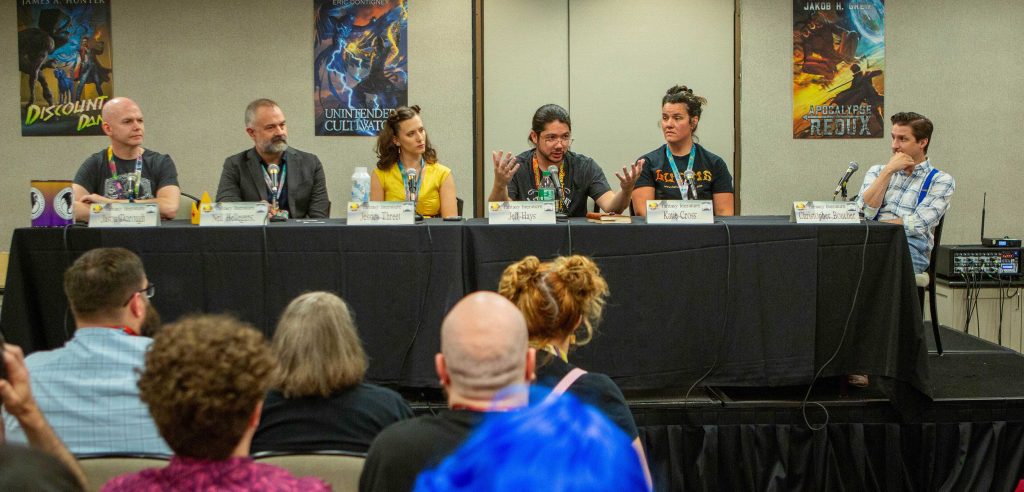
The Fantasy Literature Track welcomed a full audience for “Breaking into Audio: Becoming the Voice of Stories” on Friday at 1PM in the Hyatt Embassy. Moderated by fantasy author and voice actor Jason Dorough, the panel featured Neil Hellegers (actor and audiobook narrator), Jessica Threet (audiobook narrator, voiceover, singer), Jeff Hays (Owner of Soundbooth Theater), Katie Cross (fantasy author), and Christopher Boucher (audiobook narrator). The panelists shared candid insights on how they got their start in voice work, how they sustain their craft, and what aspiring narrators need to know before stepping up to the microphone.
Each panelist had a unique path into the world of audiobooks. Boucher began supporting a touring theater group and he would warm up by quoting The Princess Bride and mimicking all the voices, which led to a recommendation to get into voice over acting. Cross got into narration because narrators couldn’t keep up with her own fast-paced writing schedule. Her readers were frustrated that the audiobooks were releasing after print, so she began narrating her own books, because she does what her readers want.
For Hays, the journey started as a janitor for his family’s rental business while trying to become a musician. When his parents closed the business, he needed a job, and he had experience with audio engineering. He found voices.com, which started everything. He eventually landed audiobook jobs before starting Soundbooth Theater.
Threet’s love of storytelling sparked in childhood as the eldest of six children. She read aloud to her younger siblings, and enjoyed making voices. Hellegers traveled the country doing Shakespearean theater, but when he was ready to start a family, he needed to settle down and that led to audiobook narration where he found a supportive audiobook community.
When asked about stamina and technique, the panelists stressed discipline. Threet relies on vocal training, tea, and spreadsheets of accents to keep her performances consistent. Cross created a library of character voices for quick reference to help keep her characters consistent and distinct. Hays emphasized that posture, breath, and even hand gestures are crucial to embodying roles. He also built up stamina over time to build vocal endurance.
Boucher underscored the importance of pacing yourself, and hydration, reminding aspiring and new narrators that narration is both cardiovascularly and mentally taxing.
Panelists shared that recording setups can range from closets with blankets to full studio conversions. Boucher advised that space mattered more than microphone. You can get by with any microphone as long as your space is good. Cross still records successfully from a closet at home, and her children know to play outside or nowhere near her when she’s recording. Hays started with a comforter over a hangar rack in his closet and could only record for twenty minutes at a time. He once brought a thermometer in with him, and it got up to 130 degrees. He recommended reinvesting earnings into your setup. As he progressed in his career, he converted a bedroom into a studio to expand his versatility as an actor.
For those ready to try narration, the advice was practical: start small. “Get in a closet and read for two hours,” Boucher suggested. “If you can’t do that, this isn’t the job for you.”
In response to a question from Cross to the panelists about whether they stood or sat during a session, Hays noted that your body is a big part of narration. Your posture, how you hold yourself, and gesticulate helps you get into character. The more you talk with your hands, that comes through in your voice.
The discussion transitioned to how to do different dialects or accents. Threets recommended the International Dialog of English Archives (IDEA). The creators had people from around the world read a one page script in English, then would interview them to build up this catalog of accents. Hays takes lessons when working on an accent and recommended Amy Walker as a great teacher.
The panel wrapped with a question from the audience about each narrator’s favorite genre or book. Threets felt fortunate to do cozy fantasy. Hays likes horror because he “likes the idea of freaking people out.” For Hellegers, he recently completed a historical fiction project about a man from Ukraine who moved to Chicago and got involved with a Jewish crime family. He loved the opportunity because his grandfather also came from Ukraine and eventually ended up in Chicago, so it felt more personal.
